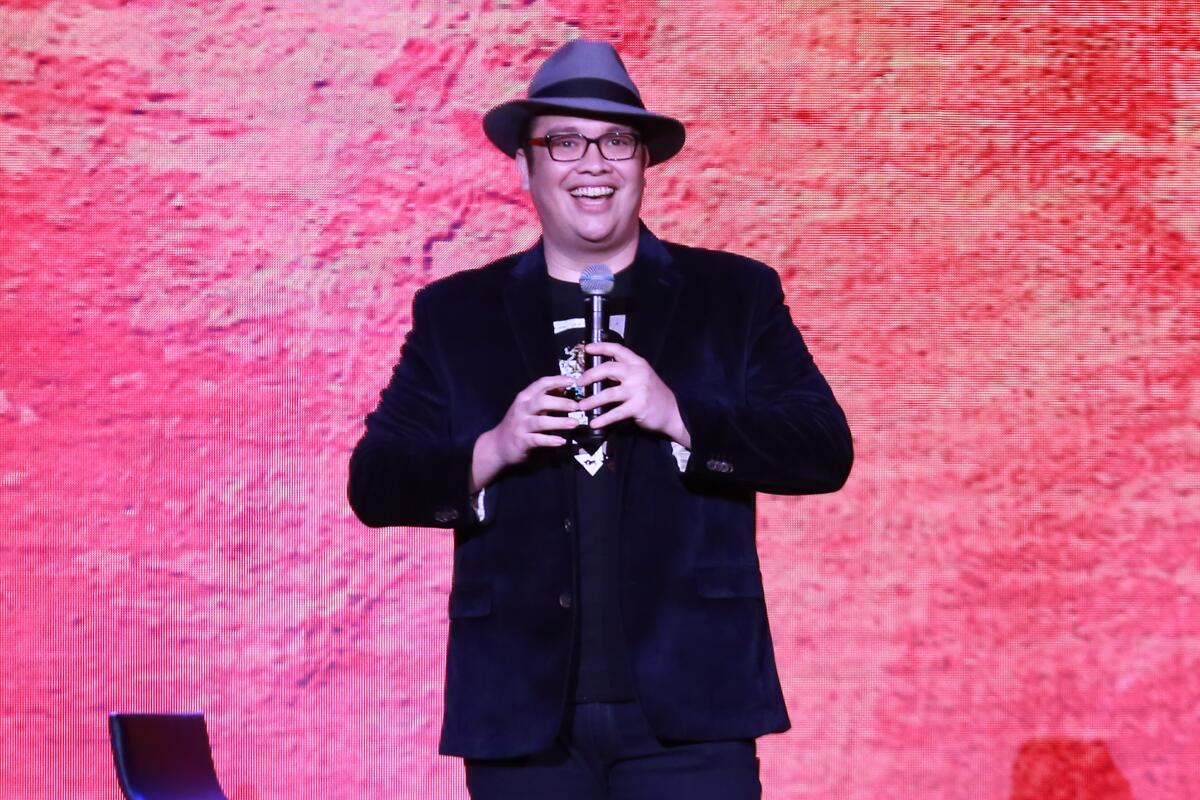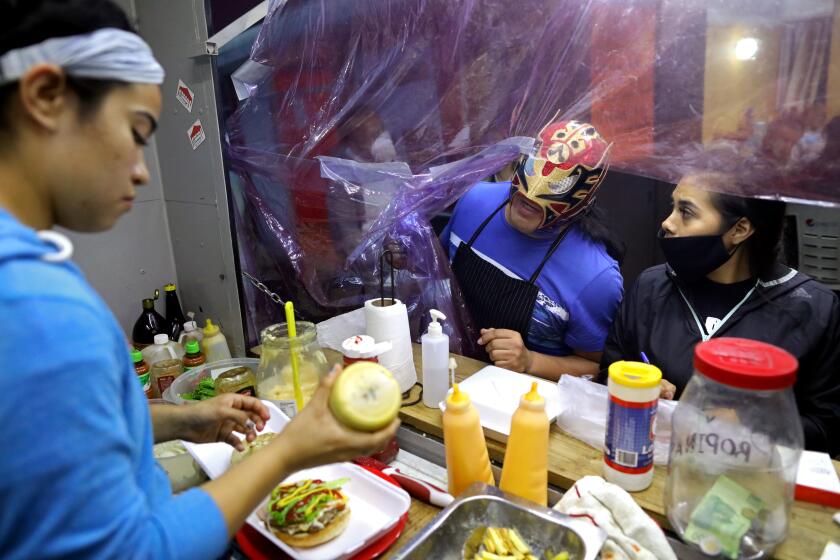How ‘standuperos’ sparked a ‘cultural revolution’ in Mexico’s comedy scene
Ten or so years ago, according to the general consensus, the very term “stand-up” — to say nothing of the format it refers to — wasn’t widely known in Mexico.
Today, though, the country is home to a booming industry centered on “standuperos” (as stand-up comics are colloquially known), fueling not only live shows but also an ecosystem of content that includes specials and reality shows on streaming platforms, podcasts, scripted series, stage plays, and even cameos in theatrical films. Just a decade on, the genre and its practitioners have become nearly ubiquitous in Mexican entertainment.
Although there’s a long tradition of idiosyncratic humor in Mexico, the auteur approach that characterizes American stand-up, which capitalizes on personal observations, was mostly foreign to older local performers. Their acts, for the most part, entailed telling jokes or creating cartoonish characters for sketches. But that changed with Mexican millennials, who came of age as digital access opened the floodgates to other forms of comedy.
“We are a culturally mixed generation. We evidently have our Mexican identity but also plenty of American influences,” said Raúl Campos Delgado, a director and producer responsible for the first batch of Netflix comedy specials in Latin America. “We are the generation of cable TV, Napster, LimeWire, so we started to import content that didn’t exist in Mexico before.”
Initially, this wave took the form of small open-mike sessions at bars, mainly in Mexico City. There, performers would test material over and over for an audience of mostly fellow comedians. Others founded workshops specifically geared toward the teaching of stand-up. And as they built a subculture from the ground up, a community was born.
“It was a very playful time where most of us didn’t see stand-up as a viable career,” recalled comedian Alex Fernández, a former office worker with two Netflix specials to his name, including his personal and moving “El mejor comediante del mundo” (“The Best Comedian in the World”). “There were no aspirations to become famous. We were just some people saying dumb things amongst ourselves.”
One of these pioneers, and the first woman to find major recognition in the Mexican stand-up space, was Sofía Niño de Rivera, often cited as a mentor to other comics in those early days. Since the genre was still such a novelty, Niño de Rivera suggests that the challenges she faced as a woman in the field were minimal, since it wasn’t yet a male-dominated space — it wasn’t dominated by anybody. “Being one of the first women doing it here, I was able to set my own rules from the beginning,” she explained.
In fact, stand-up routines represented a monumental shift in the role of comedy in Mexican political discourse. Topics that would have been off limits for broadcast television, dominated by the conglomerates Televisa and TV Azteca, found an outlet onstage, from calling out outdated norms limiting women’s freedoms to confronting stereotypical depictions of homosexuality.
Manu Nna, the first gay Latin American with a Netflix comedy special, has frequently used his work to speak about his daily existence in a homophobic society, and finding the humor in the trauma is integral to his approach. Formally trained as a theater actor, he channels his love for telenovelas, cabaret and melodrama into every routine. “Since the first day I started doing stand-up I decided to talk about homosexuality. I didn’t have anything to hide. I always say, ‘I’m a comedian and I’m gay.’ My comedy comes from that experience,” said Nna. “I think it’s very important to use comedy to denounce the things we face. My responsibility is to make people laugh while having something to say onstage for the sake of our visibility.”
Though the discussion of hot-button issues in Mexican comedy has, as in the U.S., occasionally stirred controversy, that hasn’t put off business interests. Starting around 2012, cable networks such as Televisa’s Unicable and Comedy Central tried to capitalize on the popularity of the country’s nascent style — which often went viral on social media platforms — with programming designed to highlight up-and-coming voices. Unicable’s “STANDparados” and “Comedy Central Stand-Up Presents” became invaluable launching pads.
“That was a first step that gave many of us legitimacy like, ‘Look mom, I’m on TV! This is serious.’ Someone saw me live at a bar and said, ‘This idiot can hang for 15 minutes on TV,’” said Ricardo O’Farrill, who benefited from those opportunities after starting out doing comedy on Twitter.
With profound change comes possibility: As we enter the 2020 fall season, TV has not only the opportunity, but the need, to do so. Here are some ways it might.
But, as was the case with Canadian sitcom “Schitt’s Creek,” which swept the major comedy categories at the Emmys earlier this month, even greater awareness of the Mexican stand-up scene came once Netflix expressed interest. In 2014, after several failed attempts to find partners willing to invest in stand-up programming, Campos Delgado and his partner, Félix de Valdivia, ran their idea by the streaming titan. “The pitch we presented to Netflix was, ‘There’s something happening in Mexico right now that’s really new and different. You guys should tackle this genre outside of the U.S,” said Campos Delgado.
After negotiations with Netflix, he was tasked with creating their first Latin American comedy special. The platform selected O’Farrill, who’d amassed a sizable social media following, to test the waters. He now has two Netflix specials, and two on YouTube — the latest, “Ciudadano Mexicano,” released Sept. 25.
It was a remarkable leap for the comedian and his peers: Mexican stand-up had developed so rapidly that comics with three to five years’ professional experience began to film specials — versus the eight to 10 years common in the U.S. But it proved to be a double-edged sword.
“It’s important to let your career flow organically, because you need a lot of maturity by the time you are offered a special. In my case, because of the short time I had been doing stand-up when they came to me, they should have given that first original special to someone in Spain or Colombia with more experience. I’m thankful to have been the first one, but I didn’t have the professional maturity,” said O’Farrill.
Still, the results were promising enough that over the next three years, Netflix ordered a total of 23 Latin American specials (13 in Mexico, three in Colombia, two in Chile and five in Argentina). All of them were directed and produced by Campos Delgado and his company at the time, BluePrint Content. He describes this period, which also included specials from Niño de Rivera, Nna, Fernández and the Mexican comedians Carlos Ballarta and Daniel Sosa, as “a cultural revolution.”
“I believe that the growth of stand-up comedy in Mexico would have been much slower if Netflix hadn’t bet on it,” Niño de Rivera said. “My first special took five years to conceive and the second one only a year and a half because the boom was such that they needed more on the platform. I had to speed it up and that made me grow professionally.”
There were other knock-on effects of this meteoric rise. Alex Díaz founded Casa Comedy, an agency that represents a large number of Mexico’s stand-up comics, and dedicated energy to expanding his clients’ profiles beyond stand-up. Nna earned opportunities in TV as a host and an actor; Niño de Rivera released a single-camera sitcom titled “Sobreviví” for YouTube Red in 2018; and, before it was interrupted by the COVID-19 pandemic, Fernández prepared to star in a one-man play.
“What we need to learn, as a relatively young generation of comedians in Mexico, is to focus our attention to television beyond hosting. We need to learn to write scripts, to act, to appear beyond social media,” said O’Farrill. “What makes Jerry Seinfeld Jerry Seinfeld, or what makes Dave Chappelle, Dave Chappelle? It’s not only their stand-up specials, but major TV works like ‘Seinfeld’ and ‘The Chappelle Show.’ These shows give their creators permanent recognition and that’s what makes a comedian transcend — when he creates things beyond the stage.”
‘We thought we were eternal,’ said the lucha libre star known as Olímpico. ‘We never knew something like this could happen.’

That’s exactly what Franco Escamilla has pursued. An anomaly among the group, the musician and comedian from the city of Monterrey is arguably the most internationally accomplished Mexican comic working today.
Though his roots are similar to other Mexico City-based “standuperos” — he began doing short monologues in bars, gained popularity on Facebook and appeared on “STANDparados” — Escamilla’s trajectory has diverged from his peers.
After starting his own online radio station and a successful YouTube show to supplement his live performances, his fame grew beyond Mexico’s borders, landing him an opportunity to host a short-lived show on Los Angeles’ Estrella TV as well as U.S. and world tours. Earlier this year, having built a global audience of Mexican immigrants abroad and other Spanish speakers, he became the first Spanish-language comic to perform at Carnegie Hall.
Nevertheless, Escamilla’s wide reach hasn’t sheltered him from the effects of the pandemic on his industry — one that relies heavily on in-person appearances — which has forced stand-up comedians to reinvent themselves online. Many of those who had been cultivating a fan base through their podcasts opted to develop digital live shows where viewers pay a small fee — cheaper than a ticket for a physical event — for access to a presentation that resembles variety television.
“I had to learn to live stream everything from home. I’m the one who writes and the one who produces; I also host the show. I had to become multifunctional and understand that as long as there’s no date to return to physical shows, I had to find a way to keep entertaining,” said Escamilla.
Others, like Fernández and O’Farrill, prefer to wait it out and not go through what they see as “robotic or Orwellian shows” that don’t offer real engagement with the audience. Either way, what’s clear is that Mexico’s stand-up scene will continue to adapt — to COVID-19, to technological advancements, to cultural shifts — but its rise shows no signs of slowing.
For instance, comedy podcasts hosted by pairs of “standuperos,” including “La Hora Feliz,” “El Súper Show Está Genial,” “La Cotorrisa,” and “Shishis pa’ la banda,” now dominate Spotify in Mexico with devoted followings — some reaching in the millions of listeners each month — that in turn fuel the comedians’ other enterprises. But Campos Delgado, who hosts a podcast called “Toma 1,” produced by his new venture the Original Content Society, isn’t worried that he’ll run out of things to joke about. He believes Mexico’s infinite richness will sustain its stand-up comedy boom over the long term.
“My brother always says that comedy is like food. It’s a thing of taste and balance, a thing of flavors and tolerance to acidity and sweetness,” he said. “And I believe Mexican comedy today is a delicious mole sauce, an amazing mix of mainstream influences and our own stories, traumas and flaws as a culture.”
More to Read
The complete guide to home viewing
Get Screen Gab for everything about the TV shows and streaming movies everyone’s talking about.
You may occasionally receive promotional content from the Los Angeles Times.







